
Virginia Roberts Giuffre’s posthumous memoir has just been released, detailing how she was groomed by Jeffrey Epstein and his co-conspirator Ghislaine Maxwell, whom she met at Donald Trump’s Mar-A-Lago resort. In Nobody’s Girl: A Memoir of Surviving Abuse and Fighting for Justice, she writes that she was forced to have sex with Prince Andrew three times, beginning when she was 17, and was beaten and raped by a “well-known prime minister.” Virginia Giuffre died by suicide earlier this year in Australia at age 41.
Democracy Now! speaks with Amy Wallace, Giuffre’s ghostwriter, who says Giuffre experienced the “depths of hell” with Maxwell and Epstein. “It’s not just a catalog of horrors. It’s a woman who is terribly abused as a child, escapes from that terrible abuse — valiantly — forms a family, which is in itself a triumph, and then becomes an advocate,” says Wallace.
Transcript
AMY GOODMAN: Arizona Attorney General Kris Mayes is suing Republican House Speaker Mike Johnson for refusing to swear in Representative-elect Adelita Grijalva, who was elected a month ago in a special election to represent more than 800,000 people of the greater Tucson area. Grijalva says she believes Speaker Johnson is refusing to seat her because she would be the final vote necessary on a discharge petition to release unclassified records about convicted sex offender Jeffrey Epstein.
Last week, the House Oversight Committee released a new set of Epstein documents, including call logs that included someone listed as Donald Trump.
As all of this unfolded Tuesday, an explosive memoir was released by Jeffrey Epstein survivor, the late Virginia Roberts Giuffre, titled Nobody’s Girl: A Memoir of Surviving Abuse and Fighting for Justice. Virginia was the first survivor to come out publicly against Epstein. In the book, she details how he groomed her along with his co-conspirator, Ghislaine Maxwell, who met Virginia while she worked at Donald Trump’s Mar-a-Lago resort. Maxwell is currently serving a 20-year sentence for sex trafficking.
Giuffre writes, quote, “In my years with them, they lent me out to scores of wealthy, powerful people. I was habitually used and humiliated — and in some instances, choked, beaten, and bloodied. I believed that I might die a sex slave,” she said. Virginia also details how she was forced to have sex with Prince Andrew three times, beginning when she was 17. Virginia also said she was beaten and raped by a “well-known prime minister.”
Virginia Giuffre died reportedly by suicide earlier this year in Australia at age 41. Nobody’s Girl was completed just before she died. In the book’s foreword, her collaborator, Amy Wallace, describes an email from Virginia shortly before she died that read in part, quote, “The content of this book is crucial as it aims to shed light on the systemic failures that allow the trafficking of vulnerable individuals across borders. It is imperative that the truth is understood and that the issues surrounding this topic are addressed, both for the sake of justice and awareness. In the event of my passing, I would like to ensure that Nobody’s Girl is still released,” she said.
For more, we’re joined here in our New York studio by Amy Wallace, the ghostwriter of Virginia Roberts Giuffre’s posthumously published memoir this week, Nobody’s Girl: A Memoir of Surviving Abuse and Fighting for Justice. Amy Wallace’s op-ed in Sunday’s New York Times is headlined “Why Virginia Roberts Giuffre Would Not Stop Talking About Jeffrey Epstein.”
We welcome you to Democracy Now! This book is utterly painful, the cover a photograph of a young Virginia, disappearing, fading. If you can start off by talking about this horror that she underwent, that is rocking both Britain right now and the United States? In the U.S., it may well be why Congress has not resumed working. And, of course, right now you have the situation just before the two of your book was released: Prince Andrew has voluntarily given up his titles because of what’s being released in this book. Why don’t you start off by talking about how Virginia Giuffre came to work at Mar-a-Lago as a underage young woman, and then ultimately was trafficked by both Maxwell and Epstein?
AMY WALLACE: Yeah. Well, she was 16 years old. She was working a summer job at Mar-a-Lago. She was working in the spa, so there was a particular section of the hotel that she worked in. Her father worked at Mar-a-Lago as a maintenance man, and he helped her get the job. About —
AMY GOODMAN: A man who abused her, as well?
AMY WALLACE: A man who abused her, as well, which she reveals in this book for the first time. And we can talk about that more.
But yeah, she was about a couple weeks into the job, but she loved working there. It was a beautiful place. She felt really privileged to be there. And a posh British woman walks in with an amazing outfit and very attractive. I think Virginia writes that “her handbag cost more than my dad’s truck.” There was a class issue here, clearly. And the woman sees her reading an anatomy book and says, “Oh, are you interested in massage?” And Virginia says, “Well, I don’t really know much about it, but I’m so inspired by the spa. I would love to learn.”
And she is asked to then go that day to Epstein’s house. She is — she goes because a woman has asked her and she thinks it’s going to be safe. And that very day, hours later, Ghislaine Maxwell and Jeffrey Epstein sexually abused her for the first time. And at that point, she was in the net.
JUAN GONZÁLEZ: And how did she go from Mar-a-Lago to then being close to and in the circle of Epstein?
AMY WALLACE: Well, I think, you know, there were different victims that were treated differently. There were some girls that went one time to the house in Palm Beach and then — and then were never seen again. And then there were other girls who were in the sort of inside circle.
And Virginia lived very close by. When she first met him, she lived in Loxahatchee, which is a sort of more rural, poorer area. She lived with her parents in a trailer in the back. And she — he liked her. I think that he could spot — he and Ghislaine both were very good at sniffing out girls who had already been abused and who were more vulnerable to being manipulated. And so, he quickly absorbed her into his — into his world, told her to quit her job at Mar-a-Lago. He would rent her an apartment. He didn’t want her living with her parents anymore, because he wanted her to come and go at all hours. He didn’t want — he didn’t want her parents to be suspicious.
So, very quickly, she gets — she gets pulled in. And then they say, you know, “You don’t have a passport. We need to get you one of those.” And Ghislaine Maxwell helps her fill out the application, and then — and then they take her to London. That’s really one of her first major trips. Certainly, she’d never been abroad before. They take her to London. And that’s where she’s first trafficked to Prince Andrew. She had already been, by that point, trafficked to other friends of Epstein and Maxwell. So, it was a pretty quick sort of itinerary on her going into the depths of hell. She quickly becomes one of their people that travels with them all over the world.
JUAN GONZÁLEZ: Now, in the book, she does not name many of those who she says sexually assaulted her, but you know all of them because you fact-checked them. Is there anything you have to say about that or the reason those names were not disclosed?
AMY WALLACE: Yeah, I think Virginia is pretty eloquent about this in the book. But, you know, any survivor of sexual abuse understands that coming forward, you have sort of a cost-reward ratio that you’re weighing. You know you want to hold these people accountable for what they did to you, but you also know that’s going to come at a cost — your privacy, obviously, but also, in the case of Virginia, some of these men had threatened her. Some of these men had threatened her physically. She had had death threats that the FBI found credible and called her. And she and her family rented a camper van in Australia, where they lived, and fled into the wilds of Australia for three weeks to try to figure out what to do next. So, there were real risks and legal risks. There were people that said to her, basically, “It doesn’t matter what you say or what’s true. We’re going to keep you in court for the rest of your life if you don’t take our names out of your mouth.” So, there was — there were a lot of decisions that she had to make about what names were going to go in. There are new names there, but there are — as you say, there are names left out.
I guess what I would add to that is that this book was never intended to be a list of names. If you want a list of names, you can go to the Epstein files, and they are there — not just Virginia’s names, and I know all of the ones that she told the FBI repeatedly, but other victims have bravely come forward. And this investigation has been going on for many, many years, since the first time that Epstein was arrested and charged back in two thousand, I believe, eight. There’s a lot of information there. And so, to put the — this is what my op-ed in The New York Times is about — to put the burden always on victims, the weakest among us, who’ve already been hurt, to make them repeat, repeat, repeat, repeat, repeat, repeat, on demand, instead of having law enforcement do its job. And I think that’s why a lot of the American public is calling for the release of the Epstein files.
AMY GOODMAN: In the book, Virginia writes that she was beaten and raped by a “well-known prime minister.” I think the British version of the book says “minister.” This is “prime minister.” Who is she talking about?
AMY WALLACE: Well, I can’t reveal any of the names that are not in the book. I mean, and I’ll tell you a couple of reasons why. One, this is Virginia’s book, and these were decisions that she had to make for her safety, but also the safety of her family. And just because Virginia is gone does not mean her family is not in danger. Some of these people are scary. So I respect her choices. So, I mean, I guess that’s the short answer. It’s her book, and we’re not going to go any farther than that.
There are names that she has named in public depositions. There are four document dumps. I’ve read all of them, and there are names there. The names have been released by others at times. So, the names are out there. But again —
AMY GOODMAN: One of the names that is mentioned in these document dumps is the former Israeli Prime Minister Ehud Barak, who was close to Jeffrey Epstein.
AMY WALLACE: Yes, his name is mentioned in the document dumps.
AMY GOODMAN: Let me ask you about what’s happening right now with Prince Andrew. He has voluntarily, supposedly, on the eve of the release of Nobody’s Girl, voluntarily given up his titles. But the king could strip him of his title, right? His father — I mean, his brother.
AMY WALLACE: His brother, yes.
AMY GOODMAN: His brother. He clearly — and she describes the encounters with him. She describes being raped by him the third time in an orgy, and Jeffrey Epstein’s island in the Caribbean, with young women, girls, who couldn’t even speak English because they were from another place. She said Jeffrey liked them that way because they were easier to deal with. But he clearly knew her age, right? Because at the beginning, when he was with Ghislaine Maxwell — is that Jeffrey Epstein who took the famous picture with Ghislaine in the background and Andrew with his — rather, Prince Andrew still, with his arm around Virginia?
AMY WALLACE: Yes, I mean, the back story around that photo is that Virginia always traveled with point-and-shoot disposable cameras, because she was about to be going around the world. She had never traveled in this way. She was not a person of means. Her family was not wealthy. So she traveled with these — with these little, you know, disposable cameras.
And when Ghislaine had woken her up that morning and said, you know, “Get up, sleepyhead, we’re going to have an amazing day. You’re going to meet a prince today,” and she took her shopping, and then she bought her outfits — and Virginia chose the outfit that is in that picture. And so, when he comes, when the prince comes and she’s introduced to him, she realizes — and we say this in the book — you know, “My mom would kill me if I met a prince and didn’t get a picture of it.” So she runs into her room, and she gets her camera, and she hands it to Epstein, and Epstein takes the picture. I mean, remember, this is a young woman. She is 17 at that point. When she was a child, she watched Cinderella, the movie Cinderella, on repeat. Meeting a prince was a big deal. These were supposed to be the best of us.
AMY GOODMAN: Why did Prince Andrew know her age even before she said it?
AMY WALLACE: Well, there was a game that Ghislaine Maxwell played where she would often ask people to guess the ages of the girls. And in this particular case, as we relate in the book, she says to Andrew, “Guess her age,” and he guesses correctly, 17, and then explains why he did so well at this game, because, he says, “You’re around the age of my daughters.” I think his daughters were a little bit younger.
So, the key thing there is he knew how old she was. And, you know, I think if you could line up all the men that Virginia was trafficked to and ask them why they did it, I think some of them would probably try to use as an excuse, “Well, we didn’t know they were underage.” In this case, we have a direct connection between his consciousness of her age and the reality. And that’s just sort of an amazing detail in the book.
AMY GOODMAN: And we should say —
JUAN GONZÁLEZ: I wanted to —
AMY GOODMAN: — Prince Andrew denies all of this. But I’m going to give it to Juan.
AMY WALLACE: Prince Andrew continues to deny all of this. He has settled his lawsuit. When she sued him for raping and battering her, he settled that lawsuit.
AMY GOODMAN: For millions of dollars.
AMY WALLACE: I don’t know the amount.
AMY GOODMAN: Juan?
JUAN GONZÁLEZ: Yeah, I wanted to ask you about Ghislaine Maxwell. She was not just a procurer of victims, as well. She was a direct abuser of these women, as well. Could you talk about that?
AMY WALLACE: Absolutely. I’m not quite sure how the narrative on Ghislaine Maxwell has somehow shifted, even though she’s been convicted in a court of law of being a key member of this sexual trafficking scheme. Somehow, people have started to think that maybe she was like just a receptionist or, you know, she was keeping the datebook. This is a woman who abused girls herself, didn’t just procure, which is evil enough, using her gender to lure girls into this net.
AMY GOODMAN: Poor girls.
AMY WALLACE: She did that. Poor girls, particularly. There were a few that weren’t, but most were poor. But then, she not only participated in the initial sort of initiation of these girls into the massage room and all the sex and abuse that came there, but she would then demand that they service her sexually. She would hurt them during sex. I mean, Virginia tells a story about being hurt with a ghastly sex toy that Ghislaine was using on her and intentionally hurting her, because she was dissatisfied or angry at her in some way. So, this woman is a sexual abuser herself, and this book makes that clear.
AMY GOODMAN: We have to wrap up, because I know you have to go, but I do want to just ask. When Virginia was alive, before she took her own life, she had three children, and talks about writing this when her baby girl was born, and wanting to turn the — turn around to being a survivor and to being a role model for others to speak out. President Trump, when he was running for office, ran on — one of his platforms was to release the Epstein files.
AMY WALLACE: Absolutely.
AMY GOODMAN: What would it mean to Virginia today if these Epstein files were released, that it wasn’t on people like her and all the other victims, but the files themselves to speak?
AMY WALLACE: I was with her in October in Australia. This is right before the presidential election. And she was thrilled that the former president, who was running for president, who she hoped would win the presidency — why? Because he had promised to release these files. And why was that important to her? Because it validated the experience of not just her, but so many others.
And I’m glad that you mentioned her children, as well, because one of the things this book does is it shows it’s not just a catalog of horrors. It’s a woman who was terribly abused as a child, escapes from that terrible abuse — valiantly — forms a family, which is in itself a triumph, and then becomes an advocate. So, it’s the entire arc of her life, and it’s a woman in full, a complicated woman in full, who is not just the things that were done to her. She was a person of open heart. She wanted to make the world a better place for all of us. She was really looking out for all of our children, not just hers.
AMY GOODMAN: We want to thank you so much for being with us. We hope to have you back. I want to end with the words of Virginia Roberts Giuffre herself. She writes, “I yearn, too, for a world in which perpetrators face more shame than their victims do and where anyone who’s been trafficked can confront their abusers when they’re ready, no matter how much time has passed. If this book moves us even an inch closer to a reality like that — if it helps just one person — I will have achieved my goal.” Those are the words of Virginia Roberts Giuffre. Amy Wallace, ghostwriter of her memoir, Nobody’s Girl: A Memoir of Surviving Abuse and Fighting for Justice. We will also link to your piece in The New York Times, “Why Virginia Roberts Giuffre Would Not Stop Talking About Jeffrey Epstein.”
Coming up, we look at the escalating tension between the U.S. and Colombia, after President Gustavo Petro condemned the U.S. for blowing up boats in the Caribbean. Stay with us.
[break]
AMY GOODMAN: “Hungry Ghost” by Alynda Segarra of Hurray for the Riff Raff, performing in our Democracy Now! studio.

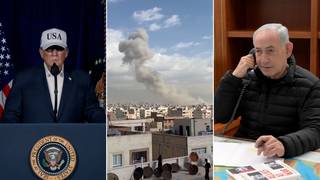


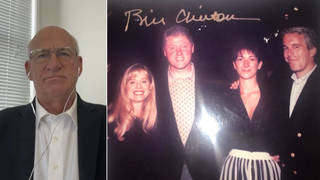




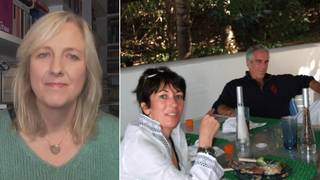
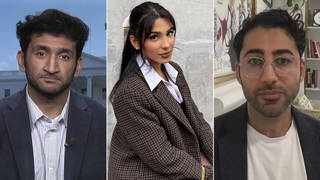
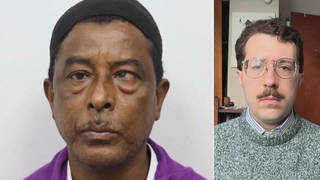
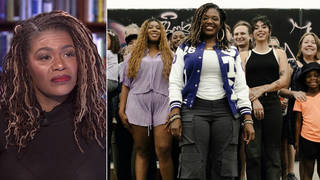
Media Options